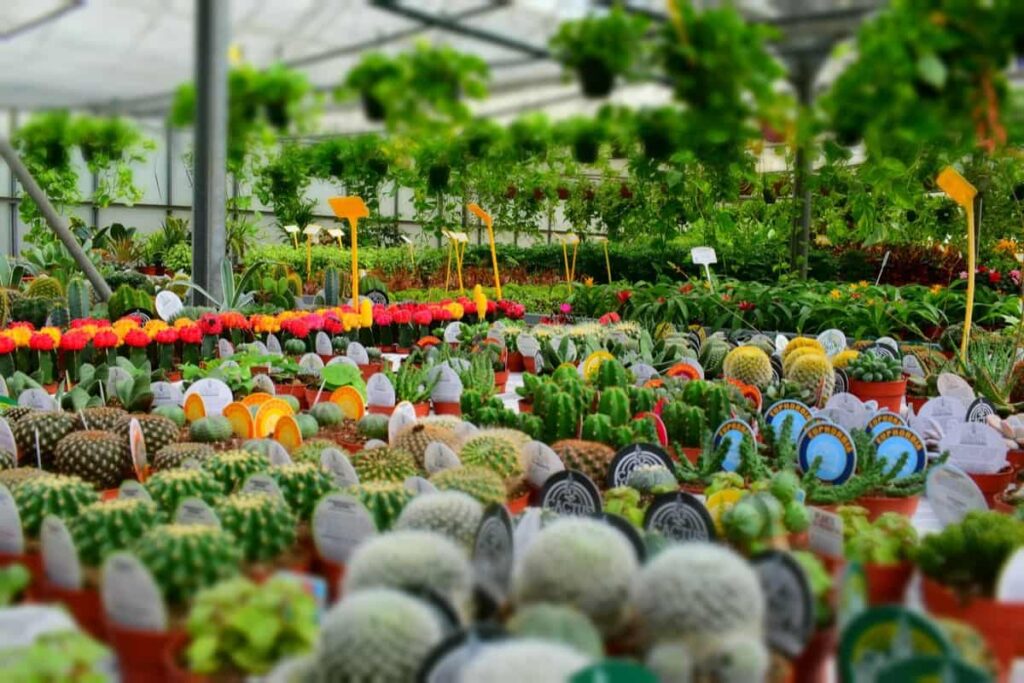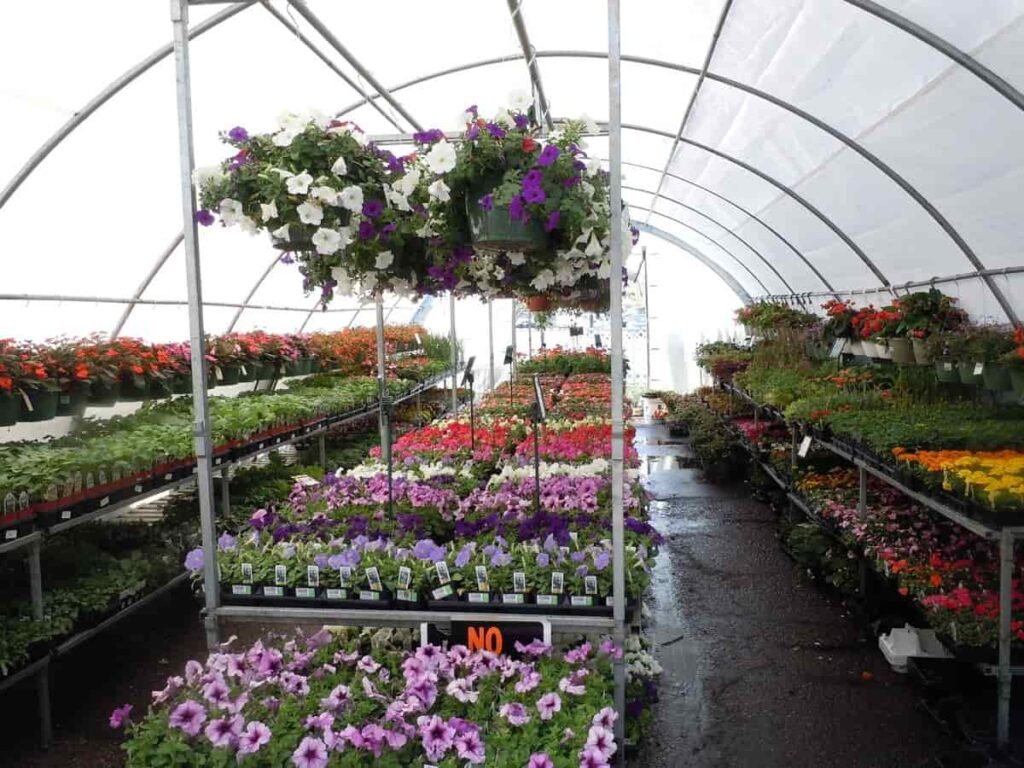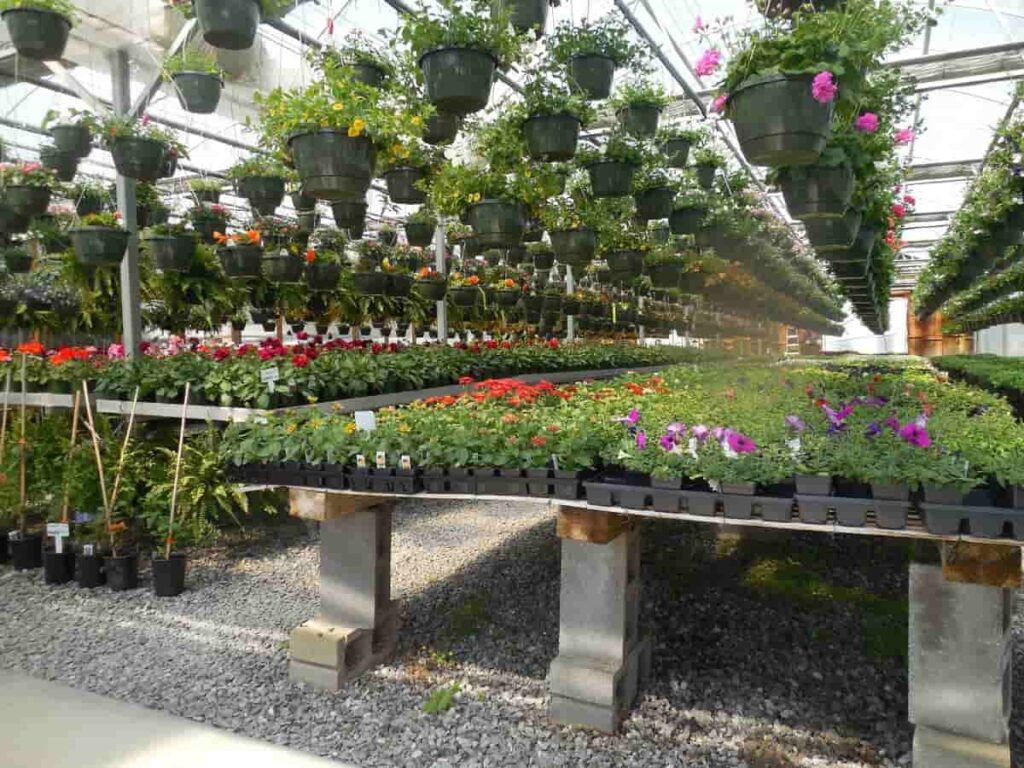Starting a plant nursery business can be a great way to become your own boss and bring in some extra income. But as with any business, there are some important things to consider before getting started. This post will discuss everything you need to know about starting a plant nursery business in India, including startup costs, types of plant nurseries, licenses, and taxes. So if you’re considering starting a plant nursery business, read on for all the information about the plant nursery setup you need to get started.

Plant nursery business plan in India
How do you start a plant nursery in India?
To start a plant nursery in India, you must obtain a local agriculture/Horticulture department license. This license costs Rs.500 . You will also need to register your business with the Registrar of Companies. The cost of this registration is Rs.1,000. Contact the horticulture department or any charted account (CA) for the exact registration and license fee to operate your plant nursery business in India.
After obtaining your license and registering your business, you will need to find a suitable location for your nursery. The ideal location for a plant nursery receives plenty of sunlight and has access to water. Once you have found a suitable location, you will need to prepare the land by clearing it of debris and leveling it off. Once the land is prepared, you must purchase plants from a wholesale nursery. The cost of plants will vary depending on the type of plants you choose to grow.
After purchasing your plants, you must pot them and label them clearly. Once your nursery is up and running, you will need to market it effectively to attract customers. There are numerous ways to market a plant nursery, including advertising in local newspapers and magazines, distributing flyers in neighborhoods, and setting up an online presence through social media and other websites.
Plant nursery requirements in India
If you are planning to start a Plant nursery business in India, you first need to obtain the required licenses and permits. The cost of these licenses and permits can vary depending on the state or city where you intend to operate your business. In addition to the licenses and permits, you will need a suitable space for setting up your plant nursery. The space size will depend on the number of plants you intend to grow and sell. A minimum of 500 square feet of space is advisable for starting a small-scale plant nursery business.
Next, you must take care of the type of plants you want to grow in your nursery. Various plants can be grown in nurseries, such as ornamental plants, fruit trees, flowering plants, etc. You need to choose the type of plants best suited for the climate conditions prevailing in your city or state. Once you have taken care of all these things, you need to develop a business plan for your plant nursery business. This business plan should include all the costs involved in setting up and operating your business and marketing strategy.
In case you missed it: How to Start Goat Farming in Bangladesh: Business Plan, Breeds, Cost, Profits, and Requirements

Plant nursery startup costs in India
When starting a plant nursery business in India, it is important to consider the startup costs that will be incurred. These costs can include the cost of land, the cost of construction, the cost of plants and trees, and the cost of labour. It is also important to consider the type of plant nursery that you want to start up. There are two main types of nurseries in India: wholesale and retail.
Wholesale nurseries sell plants and trees to other businesses, while retail nurseries sell plants and trees directly to consumers. The plant nursery cost of land will vary depending on the location of your nursery. The construction cost will depend on the size and building you require. The cost of plants and trees will vary depending on the type of plants and trees you wish to grow. Finally, the labor cost will vary depending on the number of employees you require.
When starting a plant nursery business in India, obtaining a license from the local government authority is important. The cost of this license will vary depending on the state where you intend to operate your business. In addition to a license, you will also need to pay taxes on your plant nursery business. Again, the amount of tax you need to pay will depend on the state where you operate your business.
Plant nursery business plan in India
A plant nursery business can be profitable in India with the right planning and execution. The demand for plants is always high, making this a lucrative business opportunity. However, a detailed business plan is important before starting a plant nursery. This business plan helps you map out the costs, licenses, and taxes associated with starting and running a successful plant nursery business in India. The startup costs for a plant nursery business can vary depending on the type of plants you intend to sell.
For example, if you want to sell rare or expensive plants, your startup costs will be higher than if you plan to sell common plants. Additionally, the size of your nursery will also affect your startup costs. For example, if you have a large plot of land where you can grow your own plants, your costs will be lower than if you have to rent space for your nursery. The type of license you need for your plant nursery business will also vary depending on the state in which you operate.
In case you missed it: Lobster Farming Business Plan: Cultivation Practices, Breeding to Harvesting

In most cases, you will need to obtain a general business license and a license to sell plants. In some Indian states, you may also need to obtain a horticultural license. The cost of these licenses will be included in your overall startup costs. Finally, you will also need to pay your plant nursery business taxes. The tax you owe will depend on the state where you operate and the type of business you run. Be sure to consult with a professional tax consultant.
Do you get profits in the plant nursery business in India?
Yes, plant nursery is a profitable business in India. The demand for plants is increasing daily due to the growing awareness of plants’ importance in our daily life. Many factors contribute to the profitability of plant nurseries in India. The first factor is the increasing demand for plants. This is due to the growing awareness of the importance of plants in our lives. Plants play a vital role in our ecosystem; they help purify the air we breathe, regulate the temperature of our environment, and provide food and shelter for wildlife.
Thus, there is a growing demand for plants from individuals, businesses, and organizations. The second factor is the availability of raw materials. India has a rich biodiversity, and many plants can be grown in nurseries. In addition, the climate and soil conditions vary across different regions of India, which provides ideal conditions for growing a wide variety of plants. The third factor is government support.
The government of India recognizes the importance of plants and has taken various measures to promote plant nursery businesses. For example, it has provided financial assistance to set up plant nurseries and created an enabling environment by providing easy access to land and water resources. Thus, plant nursery is a profitable business in India due to the increasing demand for plants, availability of raw materials, and government support.
Getting a plant nursery license in India
Different types of licenses are required for setting up a plant nursery in India. The first and foremost is the business registration with the Registrar of Companies. This can be done online through the Ministry of Corporate Affairs website. The next step is obtaining a local Municipal Corporation’s trade license. This is usually a one-time fee and is valid for the duration of the business. After these two licenses have been obtained, it is important to get a plant nursery license from the State Department of Horticulture.
This license is necessary to purchase plants and seeds from government nurseries. The application process for this license can be found on the department’s website. Finally, obtaining a sales tax registration certificate from the Sales Tax Department is also important. This will enable you to collect taxes on selling plants and seeds from your nursery. The application process for this certificate can also be found on the department’s website.
What are the basic facilities for a plant nursery?
Any plant nursery business plan must include a section on the basic facilities required for the business. The type of facility will be determined by the type of plants you intend to grow and sell. For example, if you are growing bedding plants, you will need different facilities than growing trees or shrubs. At a minimum, you will need some greenhouse or other protected structure to grow your plants. This structure needs appropriate ventilation, lighting, and temperature controls to keep your plants healthy.
In case you missed it: Easy Homemade Fertilizer Recipes: Natural and Organic for Houseplants, Flowers, and Garden Plants

You will also need storage space and an office area for paperwork and other business tasks. You will also need adequate outdoor space to grow larger plants, such as trees or shrubs. This space should have good drainage and be large enough to accommodate the mature size of the plants you intend to grow. Finally, any plant nursery business plan should include a detailed budget for all necessary equipment and supplies. This budget should account for one-time costs (such as the cost of constructing a greenhouse) and ongoing costs (such as the cost of potting soil and fertilizer).
What are the 4 types of plant nurseries?
There are four main types of plant nurseries: production nurseries, landscape nurseries, wholesale nurseries, and retail nurseries.
- Production nurseries produce plants for the landscaping and horticultural industry. They grow plants from seed or cuttings in a controlled environment and then sell them to landscapers, gardeners, or other businesses.
- Landscape nurseries grow plants that are used in landscaping projects. They may sell to businesses or individuals.
- Wholesale nurseries sell plants to other businesses, such as garden centers or florists. They may also sell to the general public through mail-order catalogs.
- Retail nurseries sell plants directly to consumers. They are often found at garden centers or home improvement stores.
What are the common problems of nursery plants?
Nursery plants are susceptible to several problems, including pests, diseases, and environmental stresses. Environmental stresses include excessive heat or cold, inadequate water or nutrients, and poor drainage. All of these problems can lead to reduced plant growth or even death. Pests are a common problem for nursery plants and can include aphids, mites, whiteflies, and thrips. These pests can feed on the plant’s leaves, stems, or roots and may cause them to become stunted or yellowed.
In some cases, the pests can transmit diseases to the plants. Diseases are another common problem for nursery plants. Some common diseases include powdery mildew, root rot, and leaf spot. These diseases can reduce plant growth or cause the plant to die outright. Proper care of nursery plants is essential to prevent problems from occurring in the first place. This includes proper watering, fertilization, and pest control. If you notice any problems with your nursery plants, contact a professional for advice on correcting the issue.
In case you missed it: Agricultural Business Plan: How to Start, and Profitable Ideas

Profits in the plant nursery business in India
There are various plant nurseries in India, each with different startup costs. The most common type is the family-run business, which typically requires little capital. However, you must invest more money to set up a larger operation. The cost of setting up a plant nursery also depends on the type of plants you want to grow. For example, to grow rare or exotic plants, you’ll need to invest more money than in growing common plants.
You will also need to obtain a license from the government before you can start operating your nursery. The cost of this license varies depending on the state where you plan to operate your business. Finally, you will need to pay taxes on your profits. The amount of tax you’ll need to pay depends on the state in which your business is located.
Are plant nurseries taxable in India?
In India, a plant nursery is considered a small-scale business and, therefore, subject to the same business taxes as any other small business. Three main types of taxes apply to plant nurseries: income tax, sales tax, and property tax. Income tax is levied on the business’s profits, and sales tax is levied on selling plants and other products from the nursery.
In addition, property tax is levied on the land and buildings used for the nursery. The tax a plant nursery must pay will depend on its size and location. Smaller businesses and those in rural areas will pay less tax than large businesses or those in urban areas.
Is online plant nursery profitable?
Yes, online plant nurseries can be quite profitable. However, as with any business, certain startup costs and ongoing expenses must be considered. Additionally, depending on the type of online plant nursery you operate, you may need to obtain a license and pay taxes. Regarding startup costs, one of the most important considerations is your website. You will need to invest in a good quality website design and ensure that your site is optimized for search engines. This will ensure that potential customers can easily find your nursery online.
Other important startup costs include purchasing plants and pots and investing in marketing and advertising to promote your business. Ongoing expenses for an online plant nursery include website hosting fees, plant care supplies, and shipping costs (if you sell plants online). Depending on the type of nursery you operate, you may also need to pay employees or contractors.
When it comes to licenses and taxes, this will vary depending on your nursery location and the type of business you run. For example, if you plan to sell plants online, you may need to obtain a sales tax license. In addition, online businesses must charge VAT/GST in some states. Therefore, checking with local government regulations before starting any business is always best to ensure compliance.
In case you missed it: Cinnamon Farming Business Plan: A Profitable Production Guide for Beginners

Major challenges faced in the plant nursery business
- You need to obtain the necessary licenses and permits from the government.
- You need to find a suitable location for your nursery.
- You must source the plants and other materials needed for your business.
- You need to manage the finances of your business.
- You need to market your business effectively to attract customers.
What are the five maintenance activities in the plant nursery?
The five main types of plant nurseries are production, wholesale, retail, mail-order, and online sales. Each type of nursery has different costs associated with it. Production nurseries grow plants for other nurseries or the landscaping industry. They usually have large greenhouses and staff with horticultural expertise. Wholesale nurseries sell to other businesses, such as landscape contractors, garden centers, and florists.
Retail nurseries sell directly to consumers. Mail-order and online nurseries sell plants through catalogs or websites. The startup costs for a plant nursery business vary depending on the type of nursery you want to start. For example, you will need greenhouse space, equipment, and seeds or young plants to propagate for a production nursery. A wholesale nursery requires less upfront investment, as you will not need as much greenhouse space or equipment.
However, a retail nursery will need a retail location, which can be costly. Mail-order and online nurseries have lower startup costs as they can run from home with minimal overhead costs. To start the plant nursery business, you must obtain a license from your state’s agriculture department. You will also need to pay taxes on your business income. The amount of tax you pay will depend on the state where you operate your business.
Conclusion
Opening a plant nursery in India is a great business opportunity with many potential rewards. With the right planning and execution, your nursery can be successful and profitable. Be sure to research the startup costs, type of plants you want to sell, license requirements, and taxes to get your business on the right foot. Thanks for reading.
- Profitable Village Farming Business Ideas in 2024
- High-Yield Aquaculture: Fast-Growing Fish for Farming
- Effective Fish Pond Construction Techniques for Beginners
- Irrigation and Water Management in Pineapple Farming
- Blossom to Harvest: Mastering Flowering and Pollination in Papaya Farming
- Pig Fattening Essentials: From Selection to Sale for Beginners
- Raising Wagyu Cattle: A Complete Guide for Premium Beef Production
- Soil Types and Their Water Holding Capacity
- Optimizing Irrigation Schedules for Coconut Groves for Enhanced Yield
- Espresso Your Garden: Coffee Grounds for Healthier Acid-Loving Plants
- The Best Soil Mix for Snake Plants: How to Mix Your Own Snake Plant Soil
- Green Thumb Success: Expert Tips for Cultivating Greenhouse Beans All Year Round
- Bloom All Year Round: The Ultimate Guide to Indoor Hyacinth Care
- Eco-Friendly Gardening: How to Make Liquid Fertilizer from Kitchen Waste
- Ultimate Guide to Grow Anise in Pots: Explore Seed Propagation to Harvesting
- Guide to Raising Chester White Pigs: Discover Breed Facts to Growth Management
- Mastering the Elegance: The Ultimate Guide to Weeping Cherry Tree Care, Planting, and Maintenance
- Ultimate Guide to Planting Garlic in Grow Bags: Growing Strategies for Beginners
- How to Fix Spider Plant Leaf-Related Problems: Natural and Organic Remedies
- 10 Reasons Why Your Tulsi Plant is Shedding Leaves: Home Remedies and Solutions
- Optimizing Growth and Yield: The Advantages of Palm Bunch Ash Fertilizer
- Utilizing Neem Oil Extract as a Natural Pesticide for Hydrangea
- From Soil to Harvest: Various Ways in Which Farmers Can Use AI Tools
- Steps to Encourage and Induce Citrus Flowers: A Comprehensive Guide
- How to Fix Snake Plant Leaf-Related Issues: Natural and Organic Remedies
- Transform Your Garden into a Fragrant Oasis with Raat Ki Rani (Night Blooming Jasmine)
- Discover the Ideal Chicken Breeds for Philippine Farms
- How to Create a Poultry Egg Farm Business Plan for Profits
- Grow Lemon Cucumbers Like a Pro: Insider Techniques for Bountiful Yields
- Ultimate Guide to Caring for Your Pink Princess Philodendron: Tips for Thriving Variegation
- Areca Nut Profit Per Acre: Calculating Yield and Cost of Cultivation
- How Kaveri Chicken is Becoming a More Profitable Breed in Indian Backyards
- Transform Your Barn: 9 Steps to Convert a Horse Stall into a Chicken Coop
- Exploring Suffolk Sheep Disadvantages with Limitations and Challenges
- Guide to Solving Potted Lemon Tree Problems: How to Revive Lemon Tree in Containers
- Steps to Encourage Female Pumpkin Flowers: Best Strategies for More Flowers and High Yields
